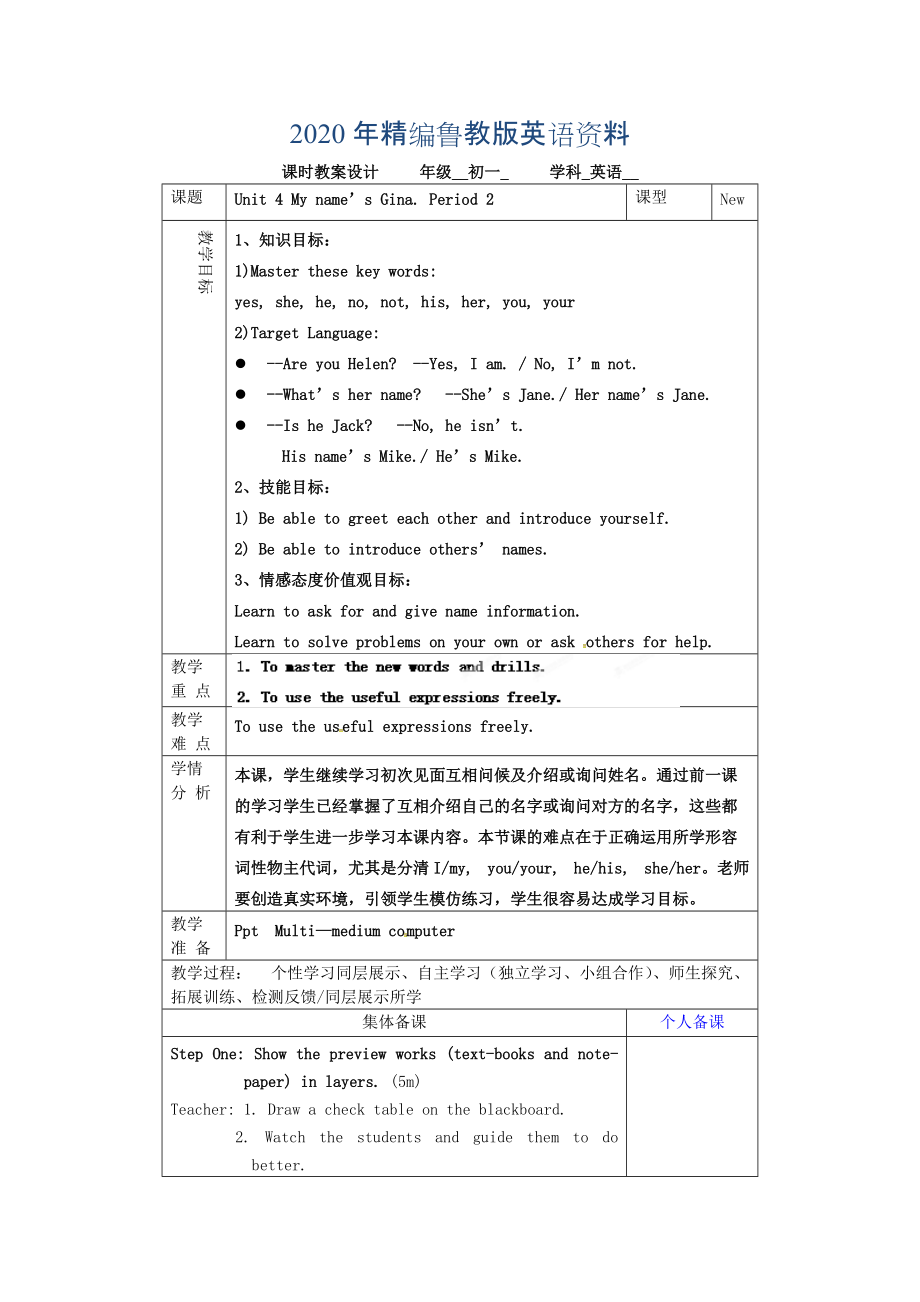《2020年魯教版英語(yǔ)六年級(jí)上冊(cè)Unit 4My name’s is Gina第二課時(shí)word教案》由會(huì)員分享��,可在線閱讀��,更多相關(guān)《2020年魯教版英語(yǔ)六年級(jí)上冊(cè)Unit 4My name’s is Gina第二課時(shí)word教案(3頁(yè)珍藏版)》請(qǐng)?jiān)谘b配圖網(wǎng)上搜索����。
1、2020年精編魯教版英語(yǔ)資料
課時(shí)教案設(shè)計(jì) 年級(jí)__初一_ 學(xué)科_英語(yǔ)__
課題
Unit 4 My name’s Gina. Period 2[
課型
New
教學(xué)目標(biāo)
1��、知識(shí)目標(biāo):
1)Master these key words:
yes, she, he, no, not, his, her, you, your
2)Target Language:
l --Are you Helen? --Yes, I am. / No, I’m not.
l --What’s her name? --She’s Jane./ Her name
2����、’s Jane.
l --Is he Jack? --No, he isn’t.
His name’s Mike./ He’s Mike.
2���、技能目標(biāo):
1) Be able to greet each other and introduce yourself.
2) Be able to introduce others’ names.
3�、情感態(tài)度價(jià)值觀目標(biāo):
Learn to ask for and give name information.
Learn to solve problems on your own or ask others for help.
3���、教學(xué)重 點(diǎn)
教學(xué)難 點(diǎn)
To use the useful expressions freely.
學(xué)情分 析
本課�����,學(xué)生繼續(xù)學(xué)習(xí)初次見(jiàn)面互相問(wèn)候及介紹或詢(xún)問(wèn)姓名�����。通過(guò)前一課的學(xué)習(xí)學(xué)生已經(jīng)掌握了互相介紹自己的名字或詢(xún)問(wèn)對(duì)方的名字�����,這些都有利于學(xué)生進(jìn)一步學(xué)習(xí)本課內(nèi)容�。本節(jié)課的難點(diǎn)在于正確運(yùn)用所學(xué)形容詞性物主代詞,尤其是分清I/my, you/your, he/his, she/her��。老師要?jiǎng)?chuàng)造真實(shí)環(huán)境�,引領(lǐng)學(xué)生模仿練習(xí),學(xué)生很容易達(dá)成學(xué)習(xí)目標(biāo)���。
教學(xué)準(zhǔn) 備
Ppt Multi—medium computer
教學(xué)過(guò)程: 個(gè)性學(xué)習(xí)同層展示�����、自主學(xué)習(xí)(獨(dú)立學(xué)習(xí)�����、小組合作)���、師生
4���、探究、拓展訓(xùn)練���、檢測(cè)反饋/同層展示所學(xué)
集體備課
個(gè)人備課
Step One: Show the preview works (text-books and note-paper) in layers. (5m)
Teacher: 1. Draw a check table on the blackboard.
2. Watch the students and guide them to do better.
3. Show the aims for students to choose.
(At the same time, students
5���、 step into the second step slowly, some by some.)
Step Two: Learn by themselves. (20m)
Students: 1. Choose learning aims.
2. Learn the new content.
1) Learn the new words and read and spell them correctly.
2) Read through the conversations in 2d and try to practice in pairs. Make new conversat
6、ions.
3) Practice introducing yourself and others in a group like 3c.
Teacher: Watch the students and help them whenever necessary. Gather questions.
Step Three: Discussion (5m)
Talk about the problems together.
Step Four: Practice: (10m)
1.3a Put the words in order to make conversations. The
7����、n practice them.
2.3b Complete the conversation and practice it with your partner.
Step Five: Summary and Test (5m)
Step Six: Show students how to preview for next class. (2d-3c)
Homework:
1. Preview the numbers 0-9, learn to read and spell them.
2. Preview the content in 1c, learn to ask for
8、others’ telephone number.
3. 選做 配套 P18 II, P19 VI, VII
小結(jié): 學(xué)科知識(shí)構(gòu)建與板書(shū)
[來(lái)
Unit 4 My name’s Gina.
Learning aims:
1) Learn the new words and read and spell them correctly.
2) Read through the conversations in 2d and try to practice in pairs. Make new conversations.
3) Practice introduc
9��、ing yourself and others in a group like 3c
Key points:
l --Are you Helen?
--Yes, I am. / No, I’m not.
l --Is he Jack?
--No, he isn’t. His name’s Mike./ He’s Mike.
反思與重建
課前檢測(cè)題:個(gè)性預(yù)習(xí)作業(yè)同層對(duì)比
課堂檢測(cè)題:Let the students translate:
1.-她叫什么名字���?-她叫Jane。
2.-你是Helen嗎�? -是的,我是����。
3.-他是Jack嗎��? -不���,他叫Mike.
作業(yè)設(shè)置:Homework:
必做:
1.Preview the numbers 0-9, learn to read and spell them.
2.Preview the content in 1c, learn to ask for others’ telephone number.
選做:
3. 配套 P18 II, P19 VI, VII
 2020年魯教版英語(yǔ)六年級(jí)上冊(cè)Unit 4My name’s is Gina第二課時(shí)word教案
2020年魯教版英語(yǔ)六年級(jí)上冊(cè)Unit 4My name’s is Gina第二課時(shí)word教案

